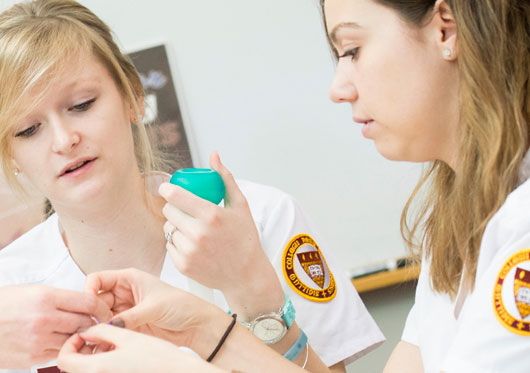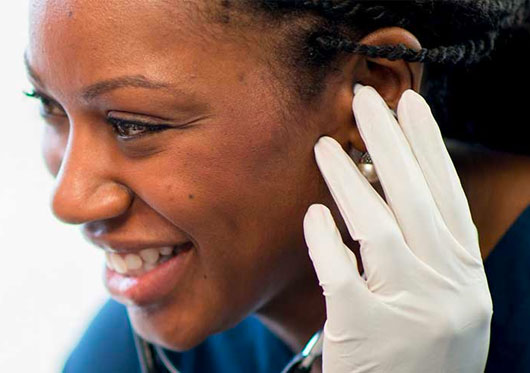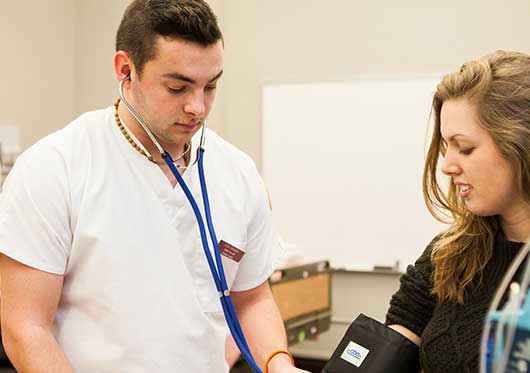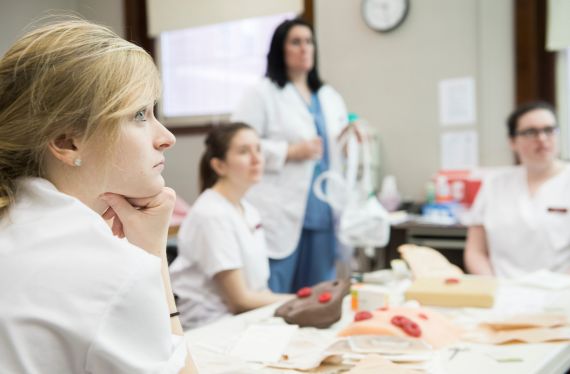According to the American Association of Colleges of Nursing (AACN), nearly 203,000 new registered nursing positions will be created each year between 2021 and 2031. This represents an annual growth of approximately five percent.
Despite this promising growth, the U.S. is experiencing a critical shortage of registered nurses—a challenge that will only intensify as our aging population requires more advanced care. This makes now the perfect time to join this impactful and rewarding profession.
This surge in demand is excellent news for aspiring registered nurses, offering high job security and competitive wages. These benefits, paired with a desire to make a difference for patients, are what inspire many to start the journey toward becoming a nurse.
Are you interested in pursuing a career as a registered nurse? Here are the steps you need to follow to become an RN, how long it will take you, and how to start planning for your future career.
Key Takeaways
- A career as a registered nurse offers a fulfilling path with opportunities to provide direct patient care, ensuring their well-being and making a meaningful difference in their lives.
- Registered nurses are in high demand, with approximately 203,000 new positions created annually, offering job security and competitive wages.
- Becoming an RN requires completing an accredited nursing program, passing the NCLEX exam, and applying for licensure, with program options ranging from associate degrees to accelerated BSN or MSN pathways.
- Accelerated nursing programs, such as those at Regis College, allow career changers and non-nursing graduates to enter the field quickly, with options like a 16-month BSN or a three-year direct-entry MSN.
Is it hard to become a registered nurse?
Before starting your journey to becoming a registered nurse, you might be wondering whether this new career path will be challenging. The short answer is: It can be.
For example, pursuing this profession means that you need to meet various nursing career requirements. These nursing programs typically offer a curriculum that includes clinical experience, practical hospital training, and lengthy theory classes. These aspects of becoming a registered nurse can be difficult but are necessary in preparing you for common challenges nurses face in the field.
Aspiring registered nurses must prepare to care for patients in a fast-paced environment. This is why the process of becoming a registered nurse isn’t a leisurely one. However, the satisfaction of being an integral part of the nursing field, helping people, and making a positive impact makes it well worth it.
How to Become a Registered Nurse
The specific steps to become a registered nurse can vary based on your state and intended practice area. Therefore, it’s important to research the specific requirements. That being said, all states will require aspiring RNs to complete the requirements laid out in this article.
To turn this goal into a reality, you must understand the specific educational, certification, and licensure requirements in your state.
Minimum Nursing Requirements
That being said, all states will require aspiring RNs to complete the following requirements:
- Complete an accredited nursing program: A number of degrees can prepare you for a job as an RN and fulfill this requirement. While earning an associate’s degree in nursing is sometimes enough to fulfill this requirement, more employers are only hiring applicants who have a bachelor’s degree in nursing (BSN). This means a BSN is often considered a de facto requirement for becoming an RN.
- Pass the NCLEX Exam: After completing your degree, you'll need to pass the National Council Licensure Examination for Registered Nurses (NCLEX-RN). This exam is designed to test your knowledge in the field of nursing. If you don't pass the exam the first time, you must wait 45 days before you can try again.
- Apply for licensure: Once you’ve passed the NCLEX, your final step is applying for licensure in whichever state you wish to practice. Depending on the backlog of applications, and the state’s specific application process, this can take anywhere from a few days to a few weeks.
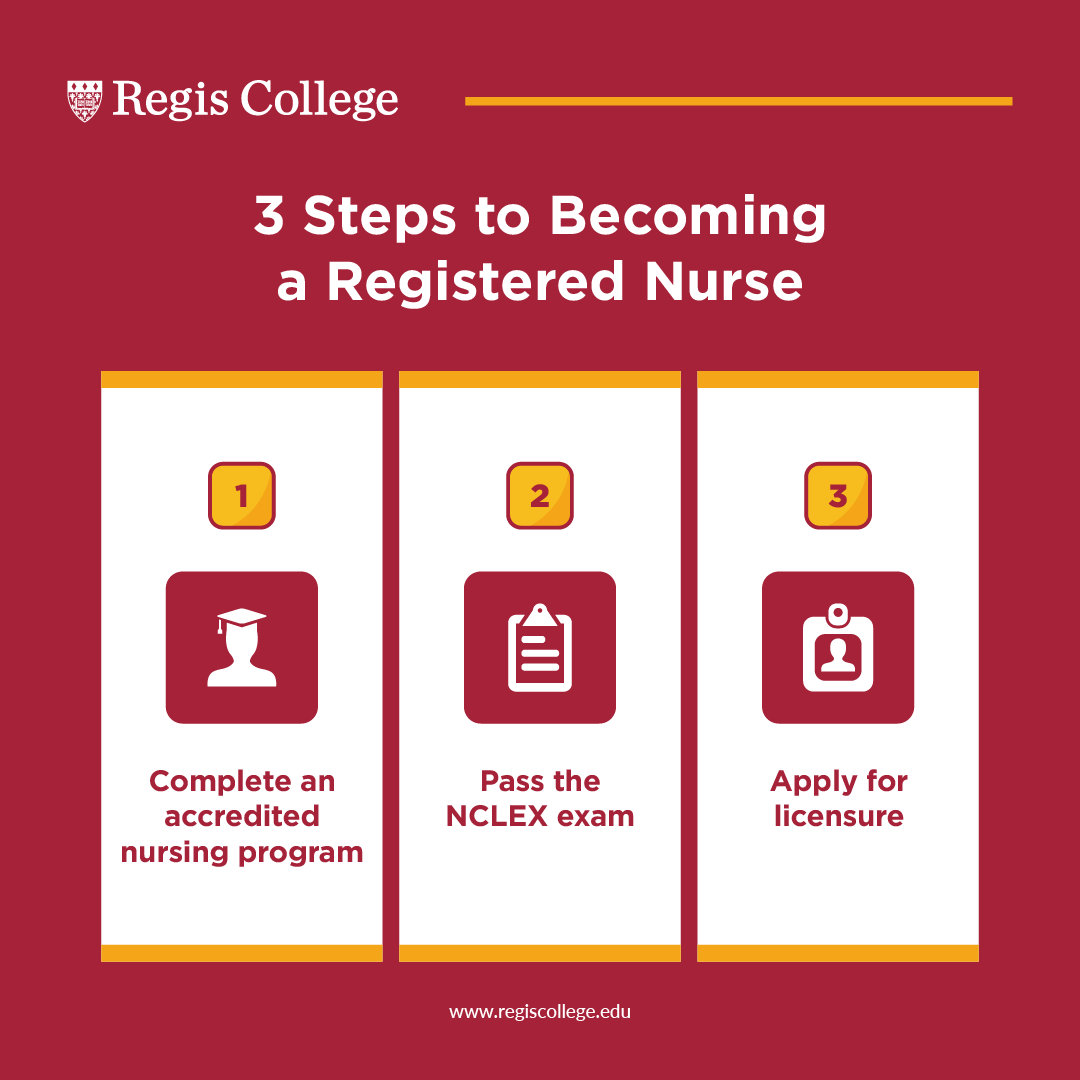
How long does it take to become an RN?
If you’re asking yourself, how long does it take to become a nurse, the answer to this question is: It varies. The factor that will impact the length of nursing school for you the most is which degree you choose to pursue. Depending on the specific nursing program you enroll in, it could take anywhere from 16 months to four years to become a registered nurse.
“I chose to earn my BSN, which takes four years,” says ChiChi Akanegbu, who completed her Bachelor of Science in Nursing at Regis College as a part of the Class of 2020. “After that, I needed to take my board exams, which added a bit of time.”
How fast can you become a registered nurse?
When it comes to adjusting your nursing school years, consider pursuing an associate’s degree in nursing. This is often the quickest way to becoming a registered nurse, especially if you’re opposed to earning a four-year degree. After all, an associate’s degree in nursing takes an average of only two years to complete. However, while an associate’s degree in nursing may fulfill the technical requirements of becoming an RN, many employers are changing their educational requirements—making an associate’s degree less valuable to prospective RNs.
With this in mind, if speed is important to you, you’re likely better served by pursuing an accelerated bachelor’s degree in nursing program, which allows you to earn your degree in less than four years.
For example, Regis College offers multiple degree options that are specifically designed to help students graduate as quickly as possible, including:
- RN-to-BS completion program: This program is designed for students who have earned their associate’s degree in nursing but who wish to return to school to complete their BSN. This program can be completed in 12 to 14 months, depending on whether the student has selected a part-time or full-time course load.
- Accelerated 16-month BS in Nursing for non-nurse college graduates: This program is designed to quickly prepare students who have already earned a bachelor’s degree in a field unrelated to nursing to earn their BSN in just 16 months, making it ideal for career changers.
- 24-month BS in Nursing for non-nurse college graduates: Like the 16-month BSN discussed above, this degree is another accelerated option for students seeking their BSN. The primary difference between the two programs is that the longer time frame allows for part-time employment.
- Accelerated direct-entry MSN: By completing this program, students will earn both their BSN and MSN in three years, preparing them for a career not only as an RN, but positioning them for advanced roles such as that of a nurse practitioner as well. This program is especially well-suited for aspiring nurses who have completed a bachelor’s degree in a field unrelated to nursing.
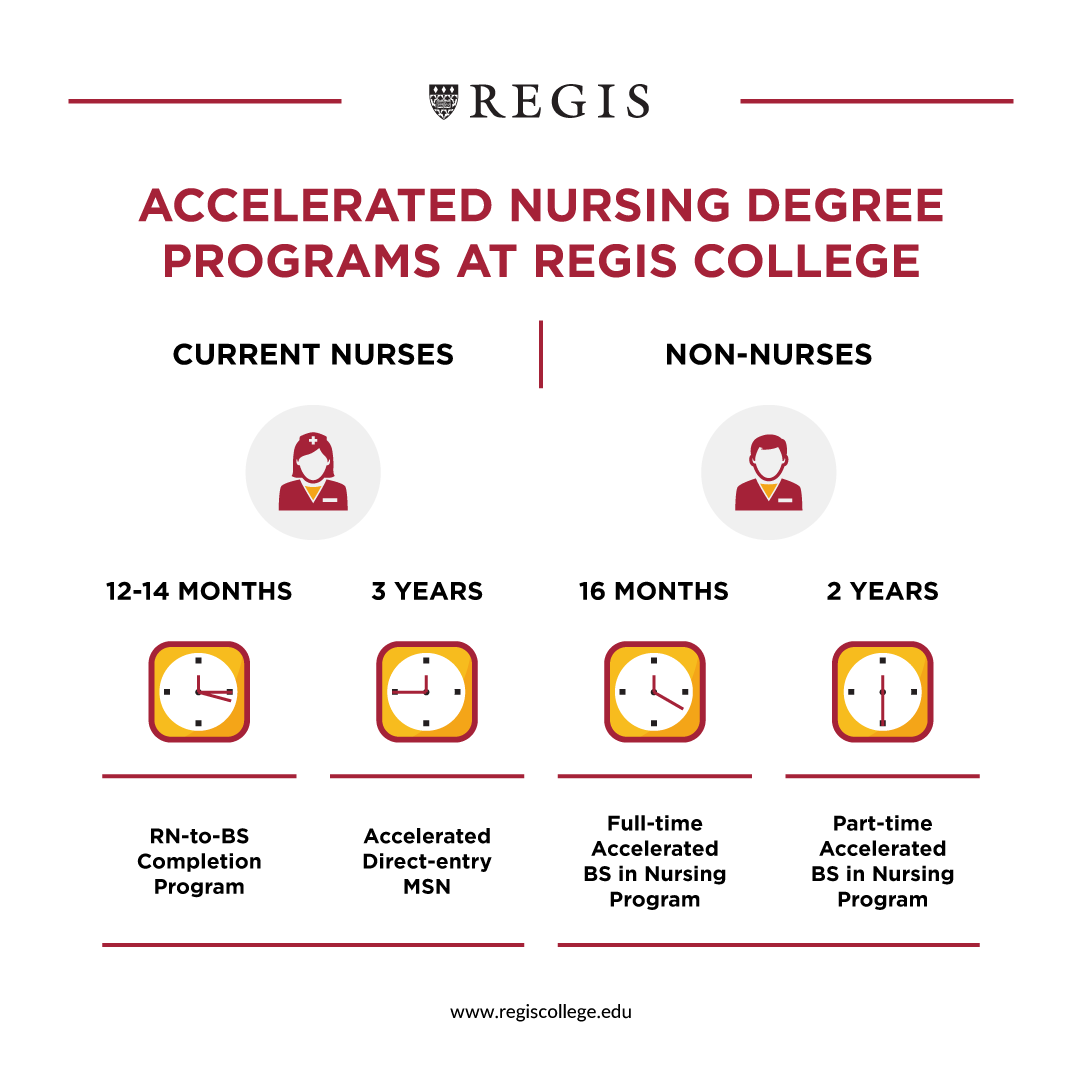
How hard is nursing school?
Nursing school is often known for its difficulty, due to the rigorous academic coursework and demanding clinical rotations. Students are expected to become proficient in a wide range of subjects—such as anatomy, pharmacology, and patient care techniques—while also developing the ability to work under pressure in real-world medical environments.
The physical and emotional demands of caring for patients, along with the need for excellent time management skills for balancing study, work, and personal commitments can also contribute to the intensity of nursing degree programs.
Despite these challenges though, the educational experience is often rewarding and prepares you for a fulfilling career in nursing.
Choosing the Right Nursing Program For You
Whether you choose to pursue a traditional four-year bachelor’s degree, an accelerated program, or an MSN, it’s important to first do your homework to ensure you’re choosing the best program for your personal and professional goals.
When selecting a program to enroll in, Akanegbu recommends students find a program that offers a curriculum specifically designed to help them pass the NCLEX.
“Out of everything, I would have to say the most challenging part of becoming an RN was the NCLEX,” she says. “High-quality programs understand the importance of this exam and use that understanding to shape their curriculum so that graduates will be prepared to take and pass the exam.”
Additionally, Akanegbu recommends finding a program where you know you’ll learn from faculty who are actively practicing in the field of nursing.
“I feel as though one of the most positive things about Regis’s Nursing program is that our faculty aren't people that have been retired for ten or so years,” she says. “They’re actively working in hospitals, which means they’re not just going off the textbook, but teaching us about what they've been through and what they continue to experience as a nurse.”


